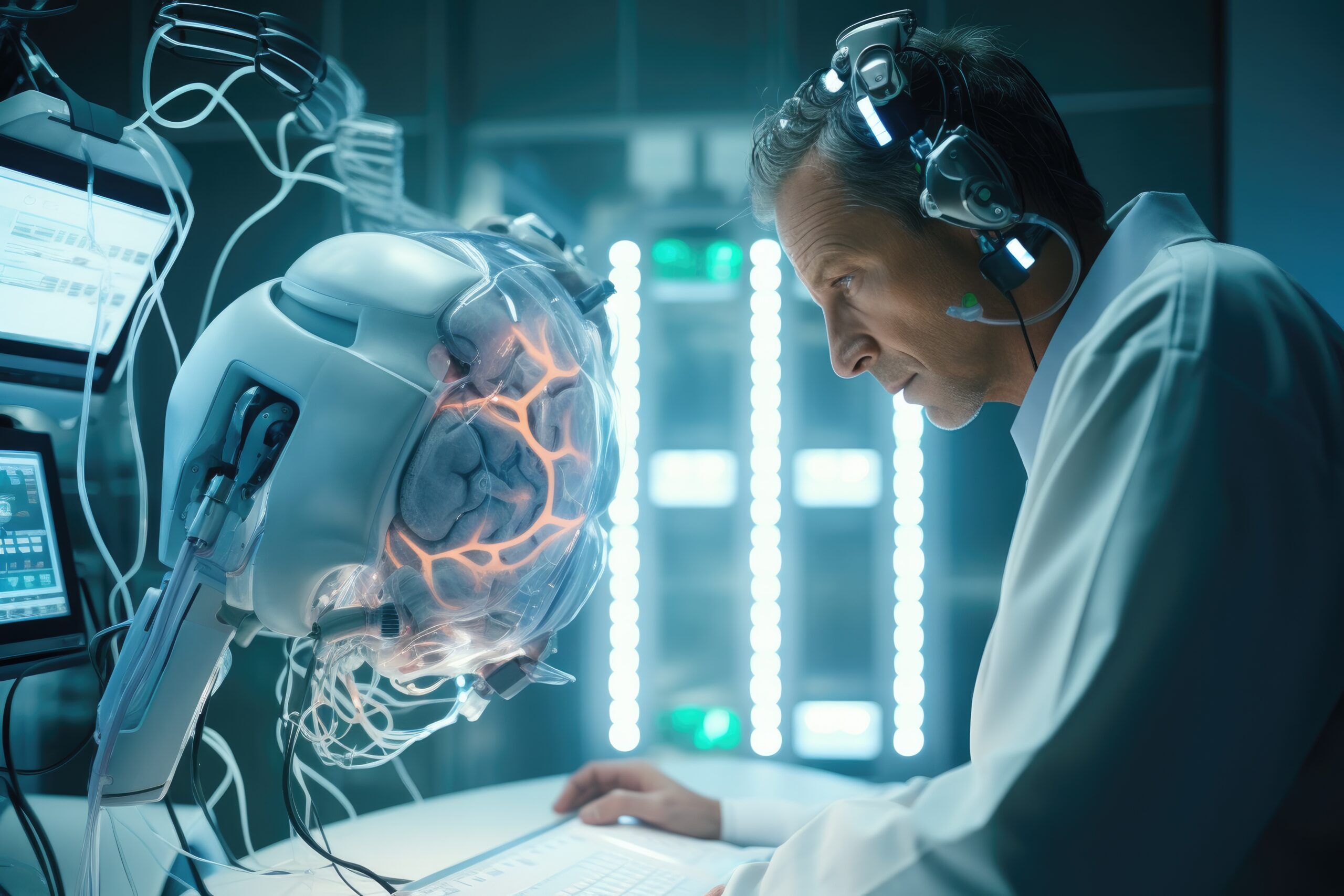Artificial intelligence (AI) is reshaping the healthcare industry, offering groundbreaking solutions to improve efficiency, accuracy, and patient outcomes. From enhancing disease diagnosis to personalizing treatments, AI’s applications in healthcare are rapidly growing. In this blog, we’ll explore the current uses of AI in healthcare, its potential impact, ethical concerns, and future possibilities, with a spotlight on how Build Future AI is driving innovations in this field.
Current Applications of AI in Healthcare
AI technology is already transforming various aspects of healthcare. Here are some key applications:
- Medical Imaging and Diagnostics: AI-powered systems are revolutionizing the way doctors analyze medical images. Algorithms can process X-rays, MRIs, and CT scans with speed and precision, detecting abnormalities that might be missed by the human eye. These systems are crucial in early disease detection, such as identifying tumors at early stages.
- Predictive Analytics: AI enables healthcare providers to predict patient outcomes based on historical data. For example, AI models can assess the risk of patient readmissions, predict disease outbreaks, and even forecast potential treatment outcomes, helping healthcare providers take proactive steps.
- Virtual Health Assistants: Chatbots and virtual health assistants powered by AI help manage patient engagement. They can answer basic health questions, schedule appointments, and remind patients to take medication. This reduces the burden on healthcare staff while providing patients with continuous support.
- Drug Discovery and Development: AI speeds up drug discovery by analyzing massive datasets to identify potential drug candidates. By doing so, AI reduces the time and costs associated with bringing new medications to market.
The integration of AI into healthcare is making healthcare delivery faster, more efficient, and more accurate. Companies like Build Future AI play a key role in helping healthcare providers implement these AI-driven technologies.
Potential Impact of AI on the Healthcare Industry
AI has the potential to transform the healthcare industry in several ways. Some of the key impacts include:
- Improved Patient Outcomes: AI systems can detect diseases earlier, leading to timely and more effective treatments. For instance, AI-based diagnostic tools have been shown to improve accuracy in diagnosing conditions like cancer, allowing for better patient care.
- Cost Reduction: By automating administrative tasks and reducing errors in diagnoses, AI helps cut down on healthcare costs. AI-powered solutions can reduce the need for redundant tests, optimize patient care, and streamline hospital operations.
- Personalized Medicine: AI can process vast amounts of patient data, including genetic and lifestyle information, to develop personalized treatment plans. This increases the effectiveness of treatments, improving the patient experience and overall health outcomes.
At Build Future AI, we specialize in providing healthcare solutions that leverage AI to improve operational efficiency, reduce costs, and enhance patient care. Our solutions help medical professionals focus on what matters most—providing the best possible care to their patients.
Use of AI in Disease Diagnosis and Treatment
One of the most exciting applications of AI in healthcare is its ability to diagnose diseases and assist in treatments. Here’s how AI is making a difference:
- Early Disease Detection: AI algorithms analyze medical data, identifying patterns that may not be obvious to human doctors. This allows for early detection of conditions such as cancer, Alzheimer’s, and heart disease, improving patient survival rates.
- Precision Medicine: AI enables personalized treatments by analyzing a patient’s unique health data, such as their genetics, medical history, and lifestyle. This ensures patients receive treatments that are specifically tailored to their needs, maximizing their chances of recovery.
- AI in Surgery: Robotic systems, guided by AI, are assisting surgeons in performing complex procedures with greater precision. These systems reduce the margin of error, resulting in fewer complications and faster recovery times.
Build Future AI is at the forefront of developing AI-driven tools that empower healthcare professionals to diagnose diseases more accurately and provide personalized treatments. By implementing these technologies, healthcare providers can improve patient outcomes significantly.
Ethical and Privacy Concerns in AI-Driven Healthcare
As AI becomes more integrated into healthcare, ethical and privacy concerns emerge. These challenges must be addressed to ensure AI is used responsibly. Some of the key concerns include:
- Data Privacy: AI relies on vast amounts of patient data to train its algorithms. Ensuring that this data is handled securely and protected from breaches is a critical concern. Data privacy laws, such as HIPAA in the U.S., must be strictly adhered to when deploying AI in healthcare.
- Algorithmic Bias: AI systems are only as good as the data they are trained on. If that data is biased or unrepresentative, the AI’s recommendations may be inaccurate or unfair, leading to potential disparities in patient care.
- Accountability: As AI systems make more decisions in healthcare, it’s important to determine who is accountable when something goes wrong. Ensuring transparency in how AI systems make decisions is essential for building trust with both healthcare providers and patients.
At Build Future AI, we take these concerns seriously and prioritize ethical AI development. Our AI healthcare solutions are designed to be transparent, secure, and free of biases, ensuring that all patients receive fair and accurate care.
Future Possibilities and Challenges of AI in Healthcare
The future of AI in healthcare is promising, with several exciting developments on the horizon. However, there are challenges to overcome. Some of the future possibilities include:
- Remote Patient Monitoring: AI will play a major role in enabling remote monitoring of patients, especially those with chronic conditions. AI-powered devices will provide real-time health data, allowing doctors to intervene early when problems arise.
- AI in Clinical Trials: AI can streamline clinical trials by identifying suitable candidates and analyzing outcomes faster. This will reduce the time and cost involved in bringing new treatments to market.
- Wearable Technology: AI-enabled wearables will continuously monitor patient health, providing insights into vital signs and alerting healthcare providers when intervention is needed.
Despite these possibilities, challenges such as regulatory approval, the need for skilled AI professionals, and the integration of AI into existing healthcare systems remain. However, Build Future AI is committed to overcoming these challenges, pushing the boundaries of what AI can do for healthcare.
Read more: https://technonetwork.co.in/
Conclusion
AI is set to revolutionize the healthcare industry, offering more accurate diagnoses, personalized treatments, and improved patient care. While challenges remain, the potential of AI in healthcare is undeniable. Companies like Build Future AI are leading the way in developing innovative AI solutions that help healthcare providers harness the full potential of AI, ensuring a healthier and more efficient future for all.





One thought on “AI Development in Healthcare: Transforming Medicine and Patient Care”